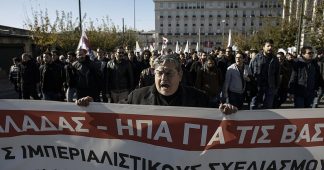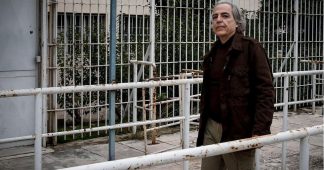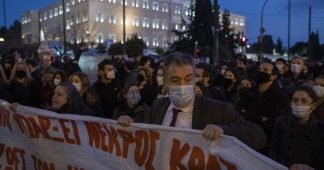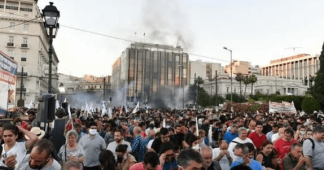By Andreas Maris
International media, including media which have correspondents in Greece, have imposed a near total blackout to information coming from this country. This should be considered as a rather serious indication of the huge international importance of what is now happening in Greece.
On Tuesday three very massive demonstrations have been held in Athens, Salonica and Samos. The demonstration in Salonica was the largest student demonstration since decades.
In Athens the Initiative of Lawyers and Jurists, various leftist organizations, a number of trade unions, including the Trade Union of Actors, organized a massive march protesting police repression and barbarism.
The demonstrators were protesting also for the treatment of hunger striker Koufontinas, whom the Greek government seems to have condemned indirectly to death and, also, for the management of the pandemic.
The actors are also protesting for what they consider as a government effort to cover up, as much as possible, the big scandal connected with Dimitris Lignadis, the ex-Director of the National Theater, who was arrested accused of raping minors. (A Greek satirical site has written that he is studying now, Epstein’s biography in the prison). It is considered very probable that this case is not an isolated one but just the tip of an iceberg. Greek “elite” was always corrupted (in most cases by “uncorrupted” European elites, like Siemens, which was paying nearly everybody in Greece). But now it seems that some of the most horrendous forms of crime are tolerated at the very center of the “elite”, making it also more vulnerable to all sorts of blackmails.
In Salonica, the students protested also for the tactics of the Police. For two weeks they had occupied a University building but they had announced they will quit it on Thursday at 11.00 local time. Instead of waiting, the Police stormed the building, and in the same time, forbid to the press to approach the scene and cover the event. Journalists Unions of Greece have protested. The result was the student demonstration which followed and new violent clashes with police.
The Greek government seems to use not a usual oppressive tactic but rather a “strategy of tension”. It is not oppressing an existing movement, it is creating it. It is provoking people in order to suppress them. This strategy was used in Greece and in Italy during the Cold War and it consists to create artificial tension, using various means including, in its full development, methods like real or fake terrorism, abductions and assassinations.
We are not yet to that point but there are many indications that we are crossing a frontier now in Greece.
As Koufontinas will, most probably, die out of a hunger strike, nobody can be sure what kind of armed attacks, either genuine or fake (provocations), can happen which could be used to justify emergence measures.
In Greece, this strategy, organized and applied by the NATO Gladio network, CIA and other agencies led finally to the colonels dictatorship in 1967.
If such a strategy of tension exists, as all indications we have seem to indicate, it cannot have been designed by Greek politicians.











